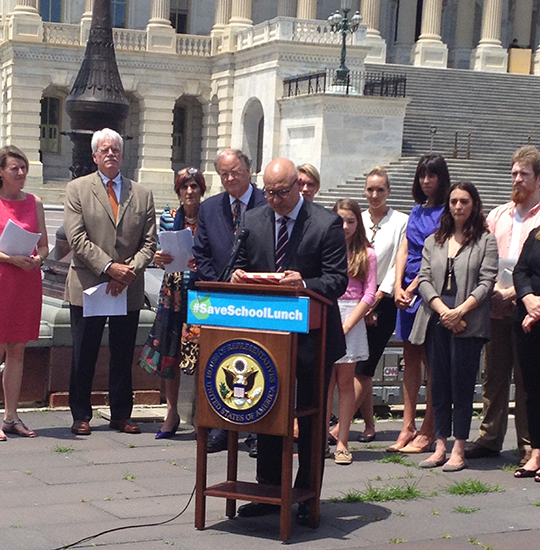WASHINGTON — It’s not just Republicans that oppose Michelle Obama’s Healthy Hunger-Free Kids Act: it’s some of the lunch ladies too.
As the House took up the 2015 Agriculture Appropriations Bill – a measure that could amend the controversial school lunch program to include waivers and looser nutritional standards – it wasn’t only politicians weighing in. Even the school lunch ladies are divided.
The House delayed passage of the $142.5 billion spending bill after debating it late Wednesday. A spokeswoman at the House majority office said Thursday the bill will head back to the House floor in two weeks.
The School Nutrition Association represents 55,000 school cafeterias nationwide. Some are supportive of the healthy lunch program, but several association leaders say that while the federal effort has good intentions it’s too restrictive and isn’t accomplishing its goals.
“We agree with the macro goal of getting kids to eat healthier, but there are many pathways to get there,” said SNA member Michael Rosenberger, director of food & nutrition services at Independent School District in Irving, Texas. “What good is healthier if the children will not eat it?”
The nutrition association reports that since the new standards were put in place in 2012, more than one million kids have stopped eating school lunches. The association also said many students who still participate and are required to take the mandatory fruit and vegetable servings aren’t eating them, resulting in $3.8 million of wasted produce thrown in the trash each day.
Cindy Marion is the child nutrition director representing Yadkin County Schools in North Carolina where up to 90 percent of kids participate in the free or reduced priced school lunches. She was one of many school nutritional experts who participated in the association’s news conference call Wednesday.
“A lot of kids are walking away from the program,” Marion said. “When a student walks away we are not affecting their diet in any way and nobody wins.”
But Democratic supporters of the federal school lunch program claim the negative statistics aren’t representative of the bigger picture. The one million students that the nutrition association claims are no longer eating school lunches make up less than 3 percent of the nearly 37 million children who are participating and benefiting from better nutrition.
“We know now that bad nutrition can get in the way of their ability to learn,” Rep. George Miller, D-Calif., said.
Celebrity chef Tom Colicchio, of the popular Top Chef reality television show, joined Democrats on Capitol Hill Wednesday to scold Republicans for attempting to derail the new nutritional standards that he said are helping combat childhood obesity.
“We’re the adults here,” Colicchio said. “We should not let young kids dictate their eating habits.”
In a May report, the U.S. Department of Agriculture stated that 90 percent of schools have met the updated nutritional standards.
Yet, the nutrition association said the USDA has yet to produce data to back up that statistic. It says schools were not asked how new standards have impacted student participation, costs and food waste. However, USDA Communications Director Bruce Alexander did provide a state-by-state report validating that 91 percent of 20,000 schools it called School Food Authorities were certified as meeting the new guidelines. But there were no statistics on cost or food waste.
“The SNA wants to work with Congress to come up with a common sense solution,” Joannie Miller, SNA member and director of child nutrition programs at Bogalusa City Schools in Louisiana said. “The nutritional standards should not be one-size-fits-all.”
Rep. Robert Alderman, R-Ala., chairman of the House Appropriations agriculture subcommittee, proposed the changes to the federal school lunch program last month, saying it was eating into school budgets.
“It’s common sense that regulations shouldn’t put local school nutrition programs under water,” said spokesman Brian Rell at Rep. Alderman’s office. “The temporary one-year waiver just throws them a financial lifeline.”
The House is expected to vote on amendments to the USDA spending bill early next week. The Healthy Hunger-Free Kids Act was part of Michelle Obama’s 2010 Let’s Move campaign to ensure nutritional foods were being served in school cafeterias in a bid to reduce childhood obesity. The White House issued a statement Tuesday threatening to veto the appropriations bill if it allows schools to opt-out of the program.

